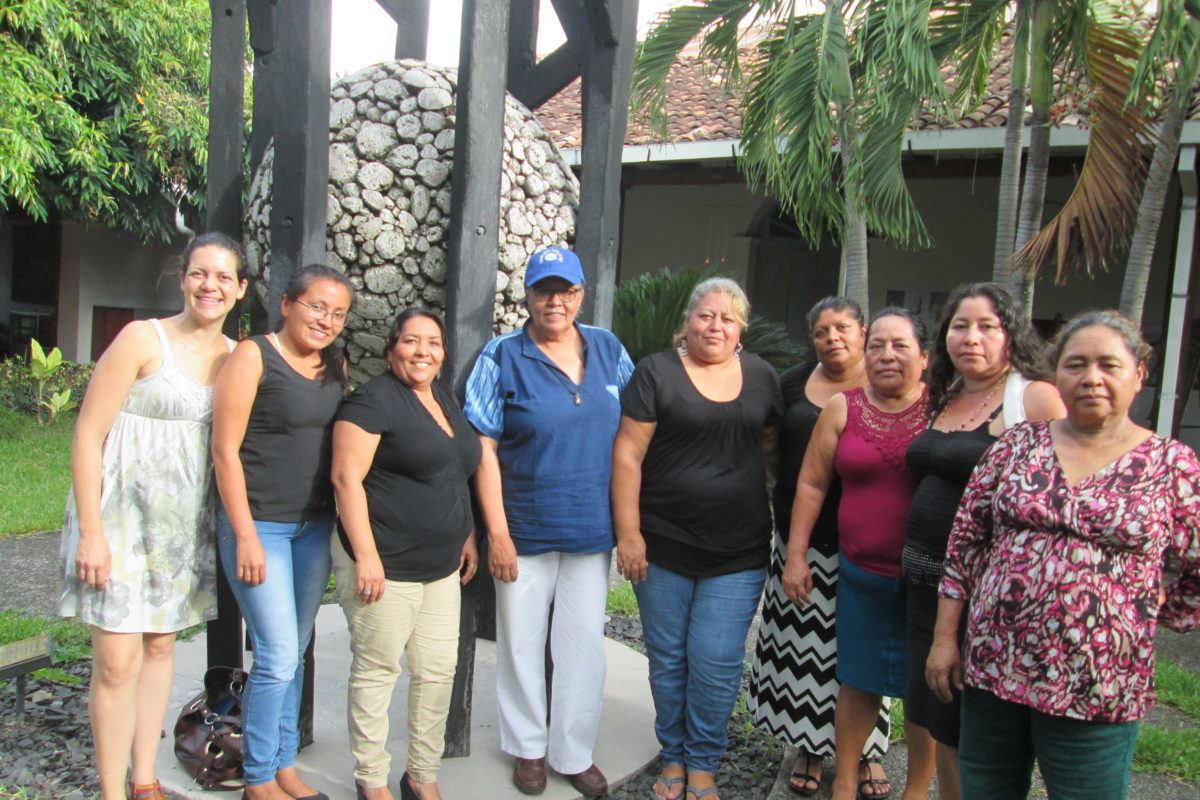
The Mary’s Pence ESPERA program grew out of a desire to partner more deeply with women in Central America and Mexico. Through this partnership Mary’s Pence provides resources, including the lending pool funds and other financial support. ESPERA staff from the region also accompany the women as they work for a better life. During their regular visits to each group, they balance stepping back to ensure the women take the leadership roles in managing their project, while providing holistic support and coaching on skills and tools that help them. This balance takes patience and practice, and is quite unique among NGOs.
Eva Martinez, the ESPERA Promoter, is from Suchitoto, El Salvador, and first worked for her local ESPERA group managing their fund. In 2012 she began working for Mary’s Pence as the staff liaison supporting four ESPERA groups in El Salvador and Honduras. To increase her capacity to support ESPERA participants, Eva was recently trained in leadership and facilitation by the National University of El Salvador.
Using techniques from the course, Eva facilitated two workshops for Epifanía, an ESPERA group in Tegucigalpa, Honduras to reflect on their experience with the ESPERA loans and their businesses, establishing a foundation from which to go forward with strength and clarity. Epifanía consists of 22 women. 13 people participated in the workshops which were held inside the Divina Misericordia parish church in the Fuerzas Unidas suburb of Tegucigalpa, Honduras.
Rio de la vida/River of Life
During the workshop in April, Eva lead the members of Epifanía through El Rio de la Vida (The River of Life) – an exercise originally intended to help people reflect on the emotions they have experienced throughout their lives. Eva adapted this activity to help the participants reflect on their journey from their first ESPERA loan to present. Beginning with personal reflection, each member created a timeline and drew their economic activities/businesses year by year, showing how it began, how it developed or changed, and what they hoped for and expected in the future. They also documented the changes in their personal life because of the investment in their business with the ESPERA loans. For example, some people were able to build or improve their homes. The participants then shared their drawings with the entire group, using them to talk openly about their experiences.
Eva had two goals for this workshop 1) that each member would recognize their abilities and the skills they have developed during their time participating in ESPERA and 2) to begin to think about business connections between members of Epifanía. The workshop was successful. “I confirmed that people’s abilities are often hidden,” Eva explained, “but with a little push they come out.” Eva celebrated that afterward “they recognized themselves as capable,” and began sharing strategies to balance work among themselves and the family members who helped run the business. She specially notes that “they also saw how the work of home tasks is more of the responsibility of women,” a good first step to sharing duties of earning money and taking care of the home equally.
They also started thinking about how to share their work beyond their families. Three of the women manufacture curtains and bed linens. These women and four others sell them. Thanks to this workshop they began a conversation about how they could coordinate their work, pool resources, and take advantage of each other’s skills.
Reforzamiento del autoestima y reconocimiento del grupo/ Strengthening of self esteem and appreciation of the group
In July, Eva connected with Epifanía for the second workshop, which focused on self-esteem and strengthening group relationships. Eva explained that “I wanted them to work with their feelings in a constructive way. The way people think and feel has a direct impact on the development of their economic activities.” Around the room, Eva placed pieces of cardboard around the walls, one for each member of the group, with their name written at the top. Each person went around the room and wrote either one word or sentence describing a positive attribute of each member. When everyone was done writing, each person explained more about what they wrote, and expressed how they felt about what was written about them.
Eva said that “these activities helped establish and strengthen links of trust between the women and ‘Centavitos de Maria’ (Mary’s Pence) so that we can work with them on topics other than economics and they can express their needs more freely. For example, they are now asking us to support them as they work for improved organization, administrative skills, mental health and techniques to combat and cope with violence.” The group even said that they would commit to spending longer periods of time with Eva to address some of these issues. She had been visiting them for two or three hours at a time, in order to manage time commitment. Now they are willing to spend the whole day participating in workshops and activities surrounding these themes.
One woman in particular impressed Eva with her strength. In addition to emotional struggles with her family, Lilian has faced many struggles with her businesses. When she used her ESPERA loan to begin selling firewood, a shortage prevented her from stocking and she was forced to begin again. She began a tiendita (a store) but because of the violence in her community, struggled to attract enough customers. Now she has begun again, buying and selling plastic dishes, as well as crocheting covers for water filters provided to members of Epifanía through a former Mary’s Pence grantee from 2008, Water With Blessings. Eva says, “I have seen her fall down and get up with dignity and courage.”
These discussions that Eva facilitated provided a same space for the women to explore their experiences as a group, to discuss the impact of ESPERA and show appreciation for each other. Acknowledging progress and recognizing abilities in themselves and each other is fundamental to the women maintaining hope and charting a path forward.
